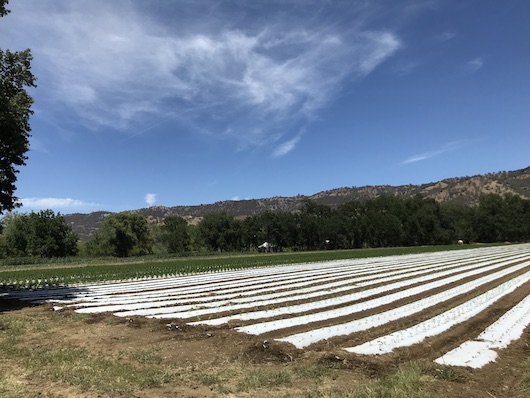
This crew is weeding flowers – they’ve got long sleeves and pants for sun protection and water containers close at hand.
Have you seen the weather forecast for Guinda this week? At the time of writing this (Sunday) the National Weather Service is forecasting 107 Monday, 102 on Tuesday and then “cooling down” after that to 99, 96, and a cool 95 on Friday. Last week we were in the high 80s, so this is quite the jump.
What does this kind of heat mean for us?
First – as always, we follow California laws. The US Department of Labor does not set heat laws for agriculture or any other industry. Absent Federal leadership, several states have created laws addressing heat. California passed the nation’s most stringent heat laws in 2005 after four farmworkers died from heat exposure. California farms must (1) allow time for workers to acclimate to high temperatures (2) provide at least one quart of cool water per hour per worker (3) provide rest and shade whenever temperatures exceed 80°F with mandatory breaks every 2 hours when temperatures exceed 95°F and (4) respond promptly to symptoms of possible heat illness and take immediate action to protect workers, including obtaining emergency medical care. The California regulations also require heat training for all workers and the farm must prepare a Heat Illness Prevention Plan. At Full Belly all supervisors have insulated water dispensers and disposable cups on their trucks and each employee is offered a half gallon personal insulated water container and a reusable water bottle.
Second – we plant things that do well in the heat. Bad news on this front – many of our heat-loving summer crops (tomatoes, basil, summer squash, eggplant, peppers, corn, etc.) are in the ground but aren’t producing yet. See photo below of one of our pepper fields that we’ve been busy transplanting! But even in the middle of summer when they are at their peak, even these plants don’t like the extreme heat and production can drop off following a heat wave. For example, when day temperatures exceed 85°F and night temperatures exceed 72°F, tomato flowers abort and we see a drop in production not long after. This heat is definitely going to wipe out some of our late spring crops, so thanks in advance for your patience as we deal with this spring/summer transition.

Third – we DON’T break out the shorts and sandals. One of the more surprising things about our summer routine is how little our wardrobes change. People will wear lighter colors, and might switch to a broader brimmed hat, but other than that, you’d be hard pressed to notice a difference. Long sleeves and pants are important to provide protection from the sun as well as from plants. Many plants like eggplants can have sharp thorns and the dust on tomato leaves can irritate the skin – thus the crew will wear gloves when harvesting, especially when harvesting tomatoes, even though that just makes the task of harvesting even hotter (and tomatoes are already the hottest thing to harvest). What I’ve been surprised by is the number of people who wear sweatshirts in hotter weather. I’ve never done this and had (and still have) my doubts, but the answer I’ve gotten from several people (including Alfonso, who leads the tomato harvesting crew) is that having a sweaty shirt next to your skin under a thicker outer layer helps keep you cool.
Finally, we adapt as much as we can. For example, we start earlier, make more frequent trips from the field to the shop to bring in harvested produce and flowers, and people buddy up on field crews to monitor each other for heat stress. But at the end of the day, we keep farming and doing all that it involves – planting, weeding, harvesting, cleaning, packing, and more. If the temperatures are unsafe, we will end the day early, but you, and our other customers are expecting CSA boxes and produce orders so baring those conditions, we keep on keeping on and look forward to both the great produce that the summer heat provides and look forward to the cooler days at the end of the summer.
Elaine Swiedler
CSA Manager
